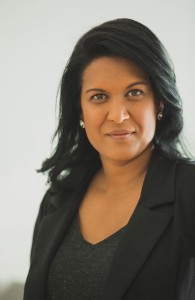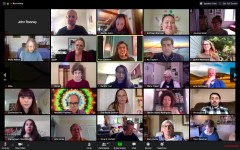 “Knowledge is our most precious resource,” says journalist Priya Clemens. She learned that during her stint as editor-in-chief of her elementary school newspaper. It’s still the foundation for all she does.
“Knowledge is our most precious resource,” says journalist Priya Clemens. She learned that during her stint as editor-in-chief of her elementary school newspaper. It’s still the foundation for all she does.
And what she’s done! Washington, DC, New York, California – she’s been a TV producer and reporter for network and local news stations all over the country. But she feels most at home in San Francisco, where she recently took on the role of host for “KQED Newsroom,” a weekly show that airs Friday nights.
The May 12 meeting of the Public Relations Round Table was held online via Zoom, and Clemens was the keynote speaker for this first-time format. Sarah Segal, PRRT board member and founder/CEO of Segal Communications, interviewed the guest while an audience of over 50 people tuned in to hear both Clemens and our 2020 Philip N. McCombs Scholarship recipients.
Inform, involve and inspire. That’s the KQED mission, and it drives Priya Clemens’s work every day.
Clemens views her new role as “a gift.” In a 30-minute show, she does three 10-minute segments every week. “This is a rare format,” she comments, noting that it allows her to explore issues of the week with local and national newsmakers. She says she couldn’t walk away from the opportunity, though she was very happy in her previous role as spokesperson for the Golden Gate Bridge District.
Among the topics she touched on were several ideas about how to pitch stories:
- Journalists aren’t experts. They’re usually working on many stories at one time, so they often don’t know much about your industry. Give them the basics and help them formulate how they see your story.
- Deadlines are not always imminent. Journalists aren’t always working on deadline, so reach out to them even in an informal way to discuss an idea you have, or to learn what their current hot topics are.
- Prepare your spokesperson. Some guests are very media savvy; others are loose cannons. Media training might be a good means of getting spokespeople to be more effective. [Readers may contact Ms. Clemens for recommendations for trainers.]
- Don’t pitch the story the same way to everyone. Tailor your pitch to the reporter’s specific needs and format. Reporters want to feel they’re discovering new things, so cultivate individual reporters and write your pitch specifically for that outlet.
- Place stories where you know other reporters will look. This can help broaden the reach of your story.
- Help the reporter get the whole story. Give them more than just your side of an issue. Offering other sources helps them get all the facts, and increases your credibility.
- Keep it short. A brief email presenting the idea and suggesting why it should be on the show is enough. Reporters don’t want to wade through a lot of material. And don’t get fancy with subject lines; “Hi, Priya” is enough.
The twist that makes her job more challenging right now is working in the world of shelter-at-home. Though KQED is operating, they’re using rented space while a renovation takes place at their headquarters. Reporters and producers work from home, and the studio is staffed by people wearing masks.
“In some ways the lockdown has made people more accessible,” says Clemens. For example, having a Skype call is faster and easier than having guests take the time to come to the studio for a segment.
In addition to the many roles she’s had as a journalist and as a spokesperson (“It makes it sound like I can’t keep a job!”), Clemens spoke about her experience being a woman in those positions. “A lot has changed over the past 15 years,” she noted. It used to be that women were judged solely by their looks, not by their knowledge and skill. Now, and especially at KQED, that has changed. Her value is seen as how she performs on the job.
Quite a journey!
 Following the interview and audience questions, board member Kathleen Brennan presented the five 2020 Philip N. McCombs Scholarship recipients. Students included Cherlenita Ericson, grad student, business administration and marketing, Golden Gate University; Arturo Fass, senior, communications studies and public relations, University of San Francisco (USF); Ciarra Nean-Marzello, senior, communications and public relations, USF; Kayla Renelle, senior, public relations and radio-television-film, San Jose State University; and Karina Tran, junior, communications, USF.
Following the interview and audience questions, board member Kathleen Brennan presented the five 2020 Philip N. McCombs Scholarship recipients. Students included Cherlenita Ericson, grad student, business administration and marketing, Golden Gate University; Arturo Fass, senior, communications studies and public relations, University of San Francisco (USF); Ciarra Nean-Marzello, senior, communications and public relations, USF; Kayla Renelle, senior, public relations and radio-television-film, San Jose State University; and Karina Tran, junior, communications, USF.
The students offered messages thanking the PR Round Table, their advisors and their parents for helping them get to where they are today. Read more about the scholarship winners here.
(You can reach Clemens with news tips at pclemens@kqed.org.)
By Phyllis L. Goodman, Board Member
Grid graphic by Ryan Quintana
